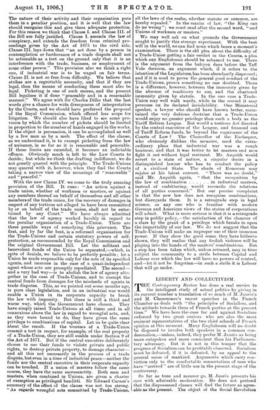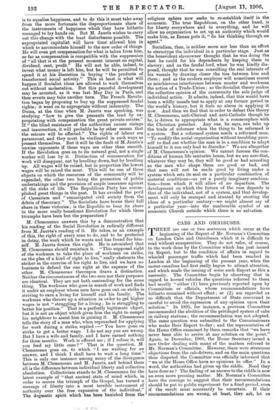LIBERTY AND COLLECTIVISM.
THE Contemporary Review has done a real service to the intelligent study of actual politics by giving in its current number a translation of so much of M. Jaures's and M. Clemenceau's recent speeches in the French Chamber as deals with "the principles of Socialism, and the attitude towards them of French parties at the present time." We have here the case for and against Socialism enforced by two great orators who are also the most eminent representatives of the two chief schools of French opinion at this moment. Many Englishmen will no doubt be disposed to involve both speakers in a common con- demnation,—unless, indeed, they prefer M. James as being more outspoken and more consistent than his Parliamen- tary adversary. But it is not in this temper that the progress of Socialism can be profitably observed. Socialism must be defeated, if it is defeated, by an appeal to the general sense of mankind. Arguments which carry con- viction only to the comfortable conservatism of men who have " arrived " are of little use in the present stage of the controversy.
So far as tone and manner go, M. Jaures presents his case with admirable moderation. He does not pretend that the dispossessed classes will find the future as agree- able as the present. The object of the Social Revolution is to equalise happiness, and to do this it must take away from the more fortunate the disproportionate share of the instruments of happiness which they have hitherto managed to lay hands on. But M. Jaures wishes to carry out this change with the least disturbance possible. The expropriated capitalist will have time allowed him in which to accommodate himself to the new order of things. He will even get compensation for what is taken from him, so far as compensation is compatible with the suppression of "all that is at the present moment interest on capital, dividend, rent, profit." He will not be able, indeed, to invest what money is left him, but he will be permitted to spend it at his discretion in buying "the products of transformed social activity." This at least is what will happen if Socialist ideas are allowed to work themselves out without molestation. But this peaceful development may be arrested, as it was last May Day in Paris, and then events may take another turn. The French Revolu- tion began by proposing to buy up the suppressed feudal rights; it went on to expropriate without indemnity. The Duma, at the time when M. Jaures was speaking, was studying "how to give the peasants the land by ex- propriating with compensation the great private estates." If "the blind resistance of the authorities causes risings and insurrection, it will probably be by other means that the seizure will be effected." The rights of labour are paramount, and they must be vindicated in such ways as present themselves. But it will be the fault of M. Jaures's unwise opponents if these ways are other than smooth. If the Revolution goes on to its natural goal, not a single worker will lose by it. Distinction of remuneration for work will disappear, not by levelling down, but by levelling up. All wages will be raised, but in proportion the lowest wages will be raised the most. This will be one of three objects on which the resources of the community will be expended, the other two being the promotion of public undertakings and the provision of ample insurance against all the risks of life. The Republican Party has accom- plished great things in the past. It has avoided the peril of Caesarism and "emancipated civil society from the debris of theocracy." The Socialists have borne their full share in these victories ; is the Republic to bear its share in the more really beneficent Revolution for which these triumphs have been but the preparation ?
M. Clemenceau answers this by a demonstration that his reading of the Social Revolution is radically different from M. Jaures's reading of it. He takes, as an example of this, the right of every man to do, and to be protected in doing, the work which he wants and has found for him- self. M. Jaures denies this right. He is astonished that M. Clemenceau should maintain it. "This supposed right of the workmen to take the place of workmen on strike, on the plea of a kind of right to live," really obstructs the striker in the exercise of his right to live, and we have no business to defend the one right at the expense of the other. M. Clemenceau thereupon draws a distinction. Neither the circumstances of the two men nor their purposes are identical. They are not both contending for the same thing. The workman who goes in search of work and finds it under an employer whose men have gone out on strike is striving to earn a living for himself and his family. The workman who throws up a situation in order to get higher wages is not "struggling for a living ; he is struggling to better his position." That is a perfectly legitimate object, but it is not an object which gives him the right to compel his neighbour to assist him in gaining it. M. Clemenceau tells the story of a man who, when reproached for applying for work during a strike, replied :—" You have gone on strike to get a better wage. I do not say you are wrong. But I have a wife and family, and I have earned nothing for three months. Work is offered me ; if I refuse it, will you feed my little ones ? " That is the question, M. Clemanceau goes on, to which "I am waiting for an answer, and I think I shall have to wait a long time." This is only one instance among many of the divergence between M. Clemenceau and M. Jaures, and behind them all is the difference between individual liberty and collective absolutism. Collectivism stands to M. Clemenceau for the latest example of "that ancient state of mind which, in order to secure the triumph of the Gospel, has turned a message of liberty into a most terrible instrument of authority over the free expansion of the individual." The dogmatic spirit which has been banished from the religious spliere now seeks to re-establish itself in the economic. The true Republican, on the other hand, is for liberty everywhere and in everything, and he will allow no organisation to set up an authority which would make him, as Renan puts it, "do his thinking through an agent."
Socialism, then, is neither more nor less than an effort to stereotype the individual in a particular stage. Just as the benevolent slaveowner thought that he was doing the best he could for his dependents by keeping them in slavery ; and as the feudal lord, when he was kindly dis- posed, thought that he was consulting the real interests of his vassals by drawing closer the ties between him and them ; and as the modern employer will sometimes resent as mischievous interference between master and workman the action of a Trade-Union ; so the Socialist theory makes the collective opinion of the community the sole judge of individual action. It admits, indeed, that this would have been a wildly unsafe test to apply at any former period in the world's history, but it feels no alarm in applying it now. And then we find that in order to defeat this theory M. Clemenceau, anti-Clerical and anti-Catholic though he be, is driven to appropriate what is a commonplace with the Christian preacher. Any one, he says, can take up the trade of reformer when the thing to be reformed is a system. But a reformed system needs a reformed man. "To modify the social organisation without troubling your- self to find out whether the man is in a condition to adapt himself to it can only lead to disorder." We are altogether of M. Clemenceau's opinion. We cannot foresee the con- ditions of human life centuries hence, but we are sure that, whatever they may be, they will be good or bad according as the men who shape them are good or bad, and that men will not be made good by living under a system which sets its seal on a particular combination of material conditions—as yet a purely imaginary combina- tion—from which it will allow of no departure. The development on which the future of the race depends is that of the individual, not of a system, and that develop- ment will only be cramped and stunted by erecting the ideas of a particular century—we might almost say of a particular year—into the unalterable symbol of an economic Church outside which there is no salvation.



































 Previous page
Previous page